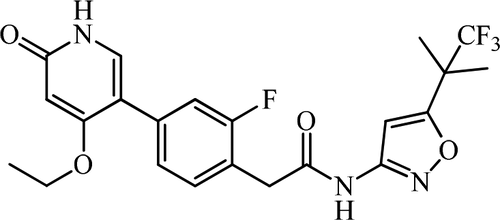当前位置:
X-MOL 学术
›
ACS Med. Chem. Lett.
›
论文详情
Our official English website, www.x-mol.net, welcomes your feedback! (Note: you will need to create a separate account there.)
Discovery of a First-in-Class Gut-Restricted RET Kinase Inhibitor as a Clinical Candidate for the Treatment of IBS
ACS Medicinal Chemistry Letters ( IF 4.2 ) Pub Date : 2018-05-24 00:00:00 , DOI: 10.1021/acsmedchemlett.8b00035 Hilary Schenck Eidam 1 , John Russell 1 , Kaushik Raha 2 , Michael DeMartino 1 , Donghui Qin 1 , Huiping Amy Guan 3 , Zhiliu Zhang 3 , Gong Zhen 3 , Haiyu Yu 3 , Chengde Wu 3 , Yan Pan 3 , Gerard Joberty 4 , Nico Zinn 4 , Sylvie Laquerre 1 , Sharon Robinson 5 , Angela White 6 , Amanda Giddings 6 , Ehsan Mohammadi 7 , Beverly Greenwood-Van Meerveld 7 , Allen Oliff 1 , Sanjay Kumar 1 , Mui Cheung 1
ACS Medicinal Chemistry Letters ( IF 4.2 ) Pub Date : 2018-05-24 00:00:00 , DOI: 10.1021/acsmedchemlett.8b00035 Hilary Schenck Eidam 1 , John Russell 1 , Kaushik Raha 2 , Michael DeMartino 1 , Donghui Qin 1 , Huiping Amy Guan 3 , Zhiliu Zhang 3 , Gong Zhen 3 , Haiyu Yu 3 , Chengde Wu 3 , Yan Pan 3 , Gerard Joberty 4 , Nico Zinn 4 , Sylvie Laquerre 1 , Sharon Robinson 5 , Angela White 6 , Amanda Giddings 6 , Ehsan Mohammadi 7 , Beverly Greenwood-Van Meerveld 7 , Allen Oliff 1 , Sanjay Kumar 1 , Mui Cheung 1
Affiliation

|
Abdominal pain and abnormal bowel habits represent major symptoms for irritable bowel syndrome (IBS) patients that are not adequately managed. Although the etiology of IBS is not completely understood, many of the functions of the gastrointestinal (GI) tract are regulated by the enteric nervous system (ENS). Inflammation or stress-induced expression of growth factors or cytokines may lead to hyperinnervation of visceral afferent neurons in GI tract and contribute to the pathophysiology of IBS. Rearranged during transfection (RET) is a neuronal growth factor receptor tyrosine kinase critical for the development of the ENS as exemplified by Hirschsprung patients who carry RET loss-of-function mutations and lack normal colonic innervation leading to colonic obstruction. Similarly, RET signaling in the adult ENS maintains neuronal function by contributing to synaptic formation, signal transmission, and neuronal plasticity. Inhibition of RET in the ENS represents a novel therapeutic strategy for the normalization of neuronal function and the symptoms of IBS patients. Herein, we describe our screening effort and subsequent structure–activity relationships (SARs) in optimizing potency, selectivity, and mutagenicity of the series, which led to the discovery of a first-in-class, gut-restricted RET kinase inhibitor, 2-(4-(4-ethoxy-6-oxo-1,6-dihydropyridin-3-yl)-2-fluorophenyl)-N-(5-(1,1,1-trifluoro-2-methylpropan-2-yl)isoxazol-3-yl)acetamide (15, GSK3179106), as a clinical candidate for the treatment of IBS. GSK3179106 is a potent, selective, and gut-restricted pyridone hinge binder small molecule RET kinase inhibitor with a RET IC50 of 0.3 nM and is efficacious in vivo.
中文翻译:

发现一流的肠道限制型RET激酶抑制剂作为IBS治疗的临床候选药物
腹痛和排便习惯异常是肠易激综合症(IBS)患者治疗不当的主要症状。尽管IBS的病因尚不完全清楚,但胃肠道(GI)的许多功能是由肠神经系统(ENS)调节的。炎症或应激诱导的生长因子或细胞因子的表达可能导致胃肠道内脏传入神经元过度神经支配,并有助于IBS的病理生理。转染(RET)期间重新排列的神经元生长因子受体酪氨酸激酶对ENS的发展至关重要,例如Hirschsprung患者携带RET功能丧失突变且缺乏正常的结肠神经支配导致结肠梗阻。相似地,成人ENS中的RET信号通过促进突触形成,信号传递和神经元可塑性来维持神经元功能。ENS中RET的抑制代表了一种新的神经元功能和IBS患者症状正常化的治疗策略。本文中,我们描述了我们的筛选工作以及随后的结构-活性关系(SAR),以优化该系列的效价,选择性和诱变性,从而发现了首屈一指的肠道限制性RET激酶抑制剂2- (4-(4-乙氧基-6-氧代-1,6-二氢吡啶-3-基)-2-氟苯基)-N-(5-(1,1,1-三氟-2-甲基丙-2-基)异恶唑-3-基)乙酰胺(15,GSK3179106),是治疗IBS的临床候选药物。GSK3179106是一种有效的,选择性的且经肠道限制的吡啶酮铰链结合剂小分子RET激酶抑制剂,RET IC 50为0.3 nM,在体内有效。
更新日期:2018-05-24
中文翻译:

发现一流的肠道限制型RET激酶抑制剂作为IBS治疗的临床候选药物
腹痛和排便习惯异常是肠易激综合症(IBS)患者治疗不当的主要症状。尽管IBS的病因尚不完全清楚,但胃肠道(GI)的许多功能是由肠神经系统(ENS)调节的。炎症或应激诱导的生长因子或细胞因子的表达可能导致胃肠道内脏传入神经元过度神经支配,并有助于IBS的病理生理。转染(RET)期间重新排列的神经元生长因子受体酪氨酸激酶对ENS的发展至关重要,例如Hirschsprung患者携带RET功能丧失突变且缺乏正常的结肠神经支配导致结肠梗阻。相似地,成人ENS中的RET信号通过促进突触形成,信号传递和神经元可塑性来维持神经元功能。ENS中RET的抑制代表了一种新的神经元功能和IBS患者症状正常化的治疗策略。本文中,我们描述了我们的筛选工作以及随后的结构-活性关系(SAR),以优化该系列的效价,选择性和诱变性,从而发现了首屈一指的肠道限制性RET激酶抑制剂2- (4-(4-乙氧基-6-氧代-1,6-二氢吡啶-3-基)-2-氟苯基)-N-(5-(1,1,1-三氟-2-甲基丙-2-基)异恶唑-3-基)乙酰胺(15,GSK3179106),是治疗IBS的临床候选药物。GSK3179106是一种有效的,选择性的且经肠道限制的吡啶酮铰链结合剂小分子RET激酶抑制剂,RET IC 50为0.3 nM,在体内有效。


























 京公网安备 11010802027423号
京公网安备 11010802027423号